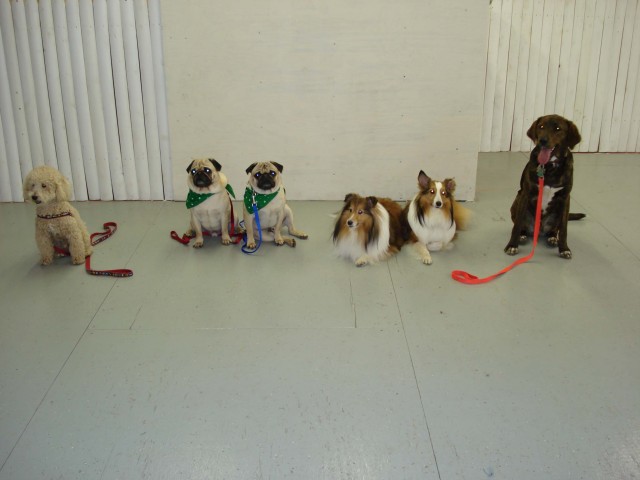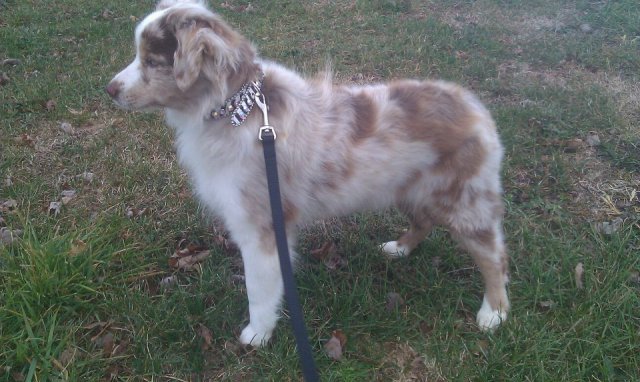QuestionBiggest problem:
I just acquired a five year old neutered male poodle/bichon mix that was supposedly paper-trained. I also have a seven year old female maltese/shih tsu that is pad trained to go out on my balcony when she needs to. The female will go to the balcony door and woof to be let out or go for a walk.
The first thing the male dog did when he came into my condo was poop on the floor although the person I got him from said he didn't need to be walked. He's well-mannered, walks easily on a leash and potties outside. He doesn't respond to any commands like sit, come, etc. and he was never taught to go on command or indicate that he needs to go. His previous owners just let him out in their back yard 8-10 times a day. I work so I take both dogs out in the morning but find that the male has peed on the floor by the time I get home. I leave the balcony door open during the day and have set up separate pads. I hesitate to put him in the bathroom while I'm at work but I'm at my wit's end.
Secondary problem:
My female has been with me since she was six weeks old and is very territorial. She growls and snaps at the male even though there was no problem when she spent a day at his house and he spent a week-end with us before I took him. I acknowledge the female as the dominant dog, feed her first, etc. Is that the right thing to do?
AnswerHi Sandy,
Here are my thoughts:
Question #1 about housebreaking:
It takes time for an animal to adjust to new surroundings, like it does most people. Don't underestimate the stress this is causing for the new dog. He will need time to understand the new surroundings and expectations. Teach him gently. He is going to need to learn a new routine, and one of the things I would suggest would be crate training to teach him bladder and bowel control.
You can do this on the weekends when you are not at work and you can also hire someone to come and let him out during the day, but you cannot leave him crated for longer than two hours - this would just be inhumane. Probably the best approach is your current arrangement with potty pads. If he has never used them he will need to get used to them - be patient with him - he is adjusting to a lot and probably grieving the loss of his previous home and owner to some extent.
You will probably need to set up some kind of confinement so that this new dog does not have free roam of the condo while you are gone.
It is also probably a good idea to keep him separated from your female dog until the two have had enough time to adjust to each other and you can be sure they will not hurt each other while you are gone. This is the female's territory and she is well within her rights to feel threatened and territorial.
You could also teach the new dog to ring bells to let him go outside to eliminate, but this won't help him while you're at work, and so I would not leave the bells out then - it would only frustrate him.
You will need to get an enzymatic cleaner if you don't already have one. I recommend Nature's Miracle or similar product. This is something you can use to help eliminate any trace of urine or stool odor to prevent your new dog from being attracted to the same spot to eliminate there again. It works by breaking down the protein in the body fluids.
I recommend you get your new dog enrolled in a basic training program with a positive reinforcement trainer - no leash corrections, choke chains, prong collars, shock, dominance/alpha stuff, etc. Clicker training is great if you can find a genuine clicker trainer where you live. Training using gentle, positive reinforcement training methods, particularly clicker training will increase your dog's confidence level and help the two of you bond.
Question #2: Dominance and territoriality
As I said above, your female dog is well within her rights to feel threatened by the new dog. It takes time for dogs to adjust to each other and they're just like people - they don't necessarily like every dog they meet. Now they have to share resources, including living space and you. That creates tension and they have to sort things out to find out exactly how all of this rearranging is going to work.
There is no such thing as a "dominant" dog. Dominance is about a relationship - which animal controls the resources, but in a home where humans and dogs are living together, it's always the human who controls the resources. Dogs may have scuffles over beds, toys, even food and treats, but dominance is about which dog controls the resources at any given time. It is a dynamic concept, not a personality trait. Hope that makes sense.
The problem of aggression is a complex one and something which I cannot address in an online forum such as this. I can tell you that what you have going on is some issue of a new dog coming into the territory of a dog that has already established the area as hers and this creates some stress and potential conflict. How serious this is or how long it will last can only be determined with a thorough behavioral assessment.
One thing I can tell you is that your female dog is probably not so much "dominant" as she is undersocialized and stressed. I do not know how well you socialized her after bringing her home, but the period of time up to about 8 weeks of age is called the dog socialization period and puppies that leave the litter prior to 8 weeks of age tend to have difficulty relating to other dogs - they miss that important instruction from their mother and litter mates.
The period of time between 8 weeks and about 4 months of age is called the critical socialization period. This is the time when puppies need to be socialized to lots and lots of different people, places, things, sounds, ground surfaces, etc. in order to develop into confident, well adjusted dogs. They should meet about 5 new people a day for the first 100 days of life and then another 100 after that, but they also should continue to meet dogs of different breeds and ages as well as animals of other species.
I cannot say if you need to feed your female dog first, but I do know that the reason to feed her first, if there is any reason to would not be because she is dominant.
What I would suggest in addition to what I have already written is to locate a qualified behaviorist to help you with this problem. You can look for a board-certified veterinary behaviorist or a certified applied animal behaviorist. Following are the websites where you can look for such an individual:
http://www.animalbehavior.org/ABSAppliedBehavior/caab-directory
http://www.dacvb.org/resources/find/
I hope these tips help. Thank you for your questions.
Cindy Ludwig, M.A., KPA-CTP

 Male Chesador
QuestionWe have a 8 month old puppy that is more than s
Male Chesador
QuestionWe have a 8 month old puppy that is more than s
 Running/Non-Obeying
Question
Star
I have a female Lab mix who has this obse
Running/Non-Obeying
Question
Star
I have a female Lab mix who has this obse
 Crystal the beagle
Question
Crystal
Crystal is 8 1/2 years old,she is a be
Crystal the beagle
Question
Crystal
Crystal is 8 1/2 years old,she is a be
 Ponter cross aggression
Question
Ollie
I have an 8 y/o pointer cross lurcher (w
Ponter cross aggression
Question
Ollie
I have an 8 y/o pointer cross lurcher (w
 Jumping.
Question
Stetson
I have a 8 month old, male mini
Jumping.
Question
Stetson
I have a 8 month old, male mini